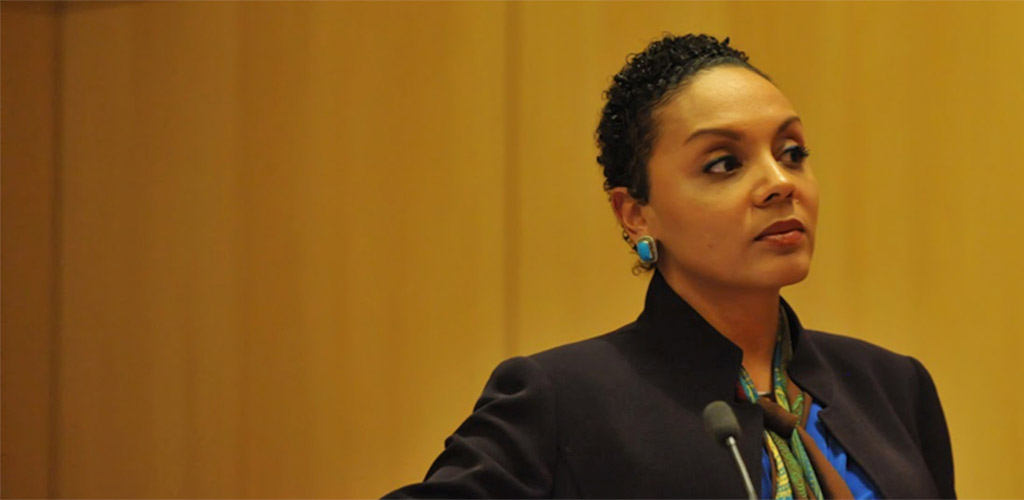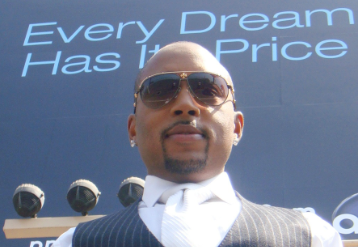
About
Gloria
Johnson
Cusack
She has survived breast cancer and her family once relied on food stamps. But Gloria Johnson-Cusack will tell you that she has lived a truly blessed life.
Johnson-Cusack was recently named CEO of the National Human Services Assembly. The organization, in partnership with HeathTrust Purchasing Group, leverages $24 billion in buying power. NHSA directs $71 million in purchasing activity of more than 80 nonprofits, including the American Red Cross, Boy Scouts of America, and United Way. The aim is to help the groups save money so they can put more resources into their community programs.
On her way to the top, Johnson-Cusack has never lost sight of where she comes from. Having been raised in the segregated neighborhoods of Washington, D.C., she knows firsthand what it takes for children from underprivileged backgrounds to succeed – and how far a little help can go.
What was life like growing up?
I grew up in D.C. with three siblings. We looked like the “Cosby” family on TV (literally, in our house with a white picket fence) but – financially – we were more like the lower income inhabitants in Bill Cosby’s cartoon creation, “Fat Albert and the Cosby Kids.”
Daddy ran a watch repair shop. Mom was a local government worker. But my parents locked horns in a decade-long divorce and custody battle. That translated to episodes of food stamps, no real dental or medical care, no such thing as savings.
Students from my junior high school were famous for ransacking buses that transported kids from three public housing projects. Our students were in the news for tearing out the paper ads inside the buses and throwing them out the windows; that's in addition to the typical graffiti works. Then, I got a high school scholarship to the prep school where President Obama’s kids now attend. Life changed.
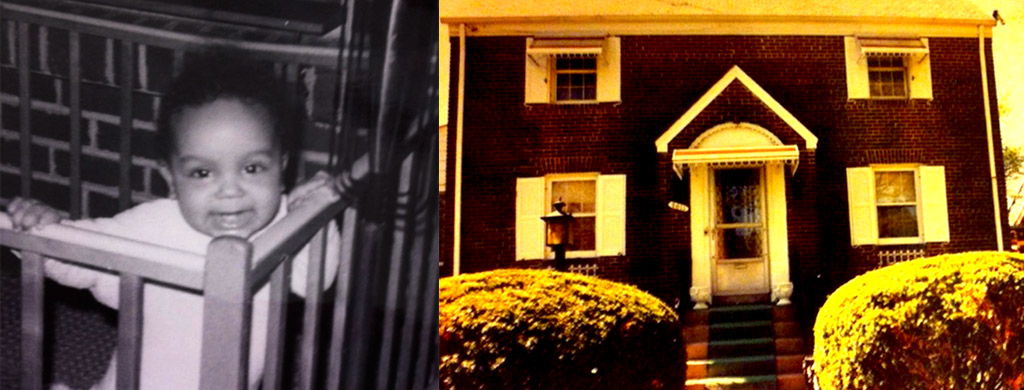 On Varnum Street in NE Washington DC..
On Varnum Street in NE Washington DC..
Please describe how you and your family fit into the neighborhood that you grew up in.
In retrospect, I was saved by my zip code. Even though our family finances were awful, I still spent my formative years in a safe neighborhood with intact families. We had high expectations from Dad’s stories about being a Morehouse classmate of Dr. King and from Mom’s stories about escaping sharecropping.
Most of my neighbors succeeded. More now than before, new research tells us a person’s zip code is the top predictor for poverty, not necessarily personal drive. When I work with business and philanthropic partners, I aim for more equality of opportunity, irrespective of zip codes. It’s that outcome, or else our workforce and our country will stagnate amidst enormous potential.
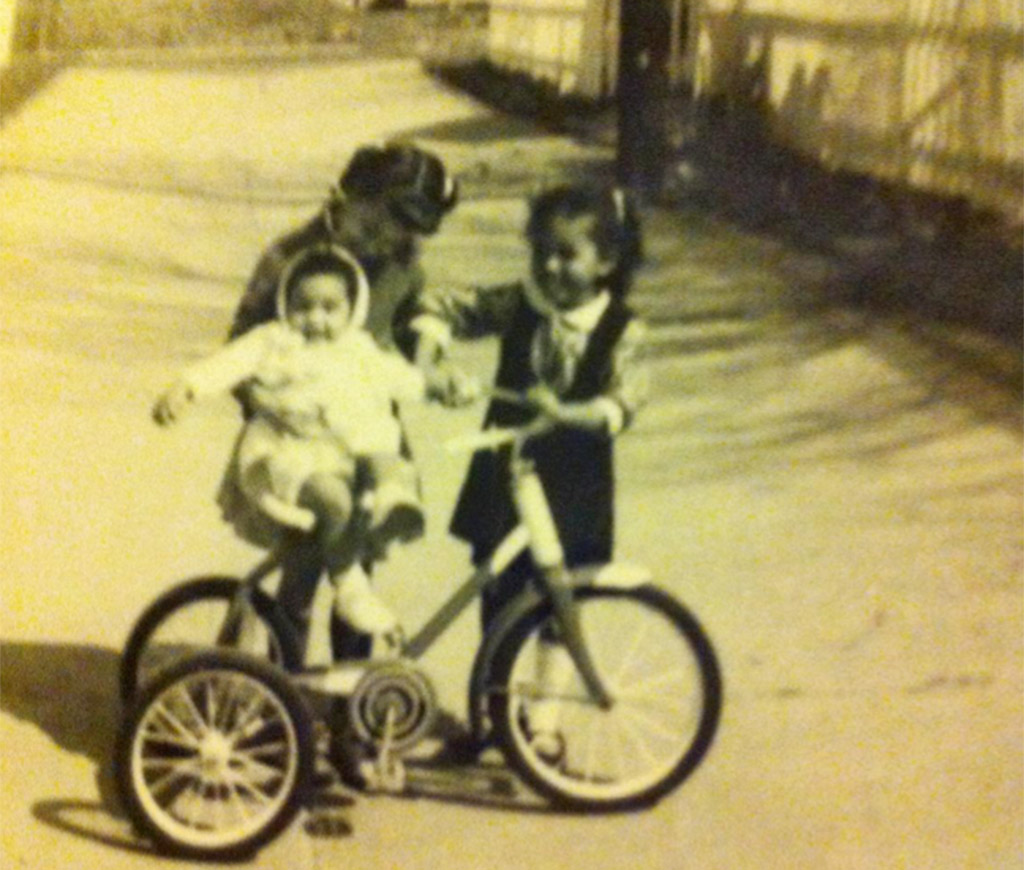 Playing outside of the family home, white picket fence and all, in 1966 with sisters Inga and Renee. “King David,” (finally a boy!) came two years later.
Playing outside of the family home, white picket fence and all, in 1966 with sisters Inga and Renee. “King David,” (finally a boy!) came two years later.
What was the biggest hurdle you ever encountered and how did you overcome it?
Since age 14, I’ve had to learn how to get over being unproductively mad. Mad about unequal opportunity and about wasted human potential that results. Why were almost all the people on my 2-hour bus commute to the prep school divided by race and class? There were scruffy dressed people of color off-loading at one stop, and professionally dressed white people loading at the very next?
When I stumbled across some research in college about my family’s Haliwa Saponi tribe in North Carolina, I wondered how it’s possible for rich forest land that could have been a source of livelihoods to be snatched with no real remediation? I now understand the fancy name for that feeling is “righteous indignation.” I try to channel that energy into my work.
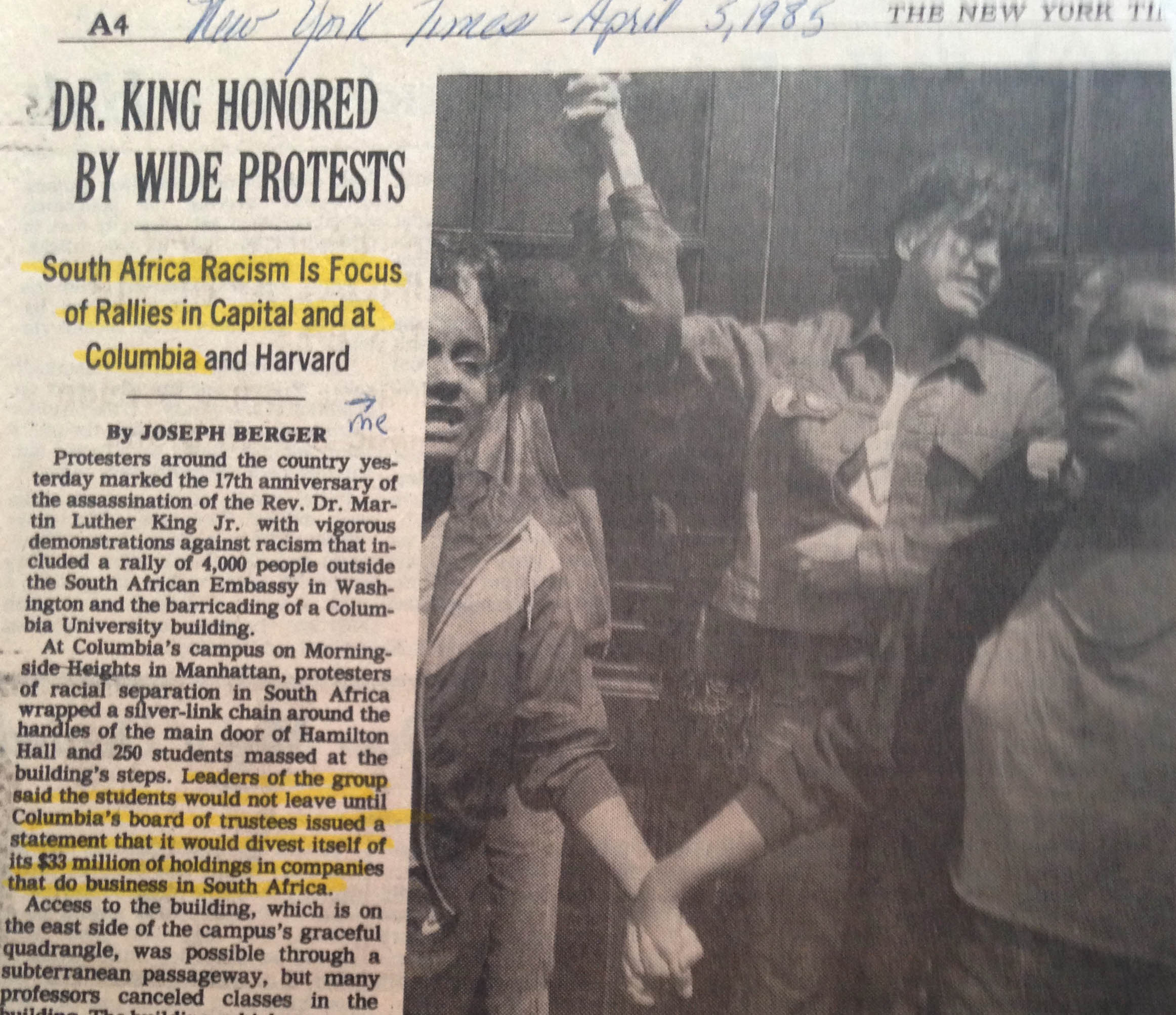 April 5, 1985 - That’s me, handcuffed to the doors of Columbia College during a protest against apartheid and the investing ventures that supported it. I was 19 and a freshman at Columbia. My dad had to take blood-pressure pills when he saw this New York Times photo. He was convinced Columbia would take away my very substantial financial aid.
April 5, 1985 - That’s me, handcuffed to the doors of Columbia College during a protest against apartheid and the investing ventures that supported it. I was 19 and a freshman at Columbia. My dad had to take blood-pressure pills when he saw this New York Times photo. He was convinced Columbia would take away my very substantial financial aid.
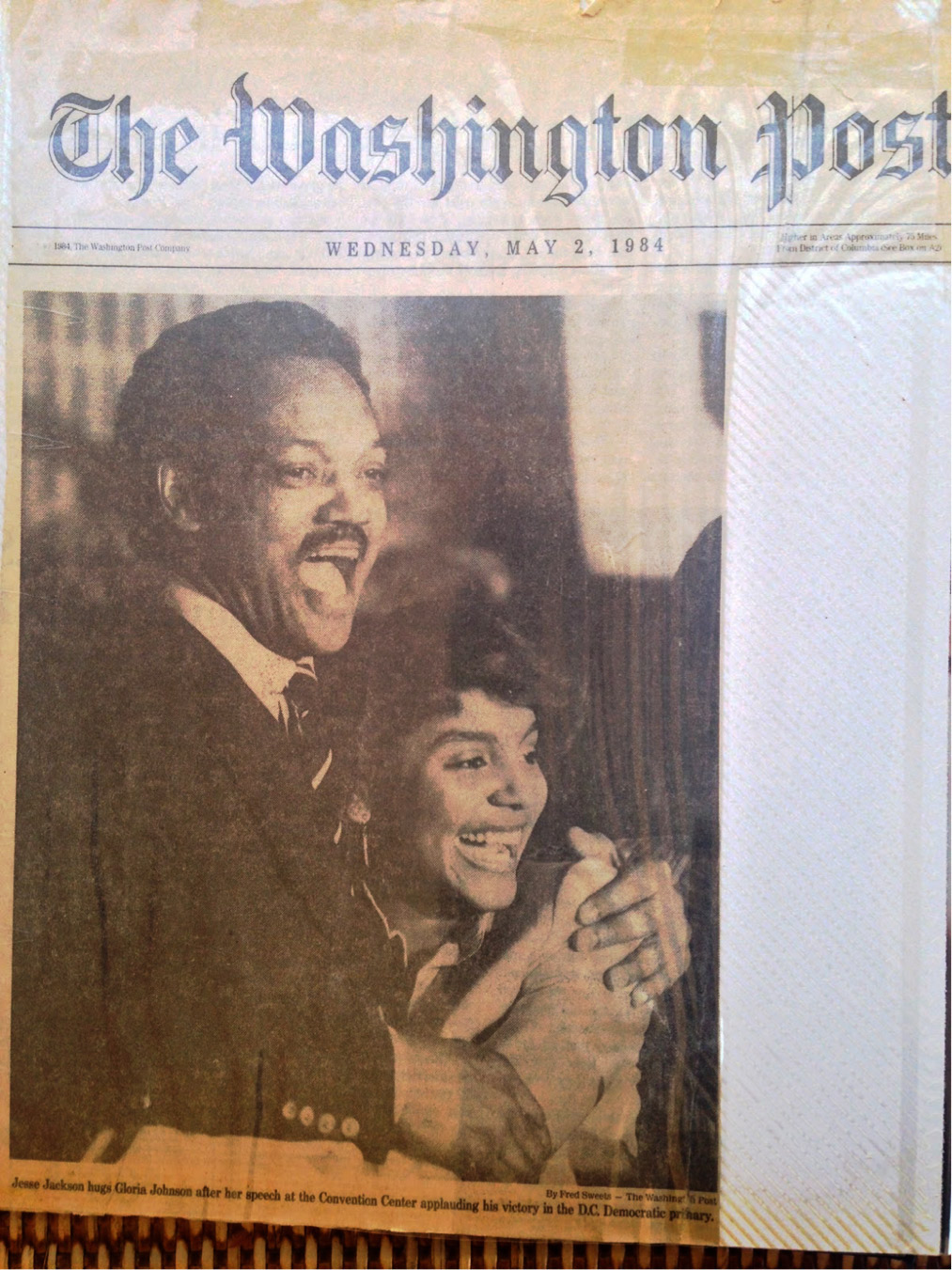 After I spoke at the celebration of Reverend Jesse Jackson’s win for the Presidential primary for the Democratic Party in 1984. I was 18 and I addressed why more people from all walks of life should vote.
After I spoke at the celebration of Reverend Jesse Jackson’s win for the Presidential primary for the Democratic Party in 1984. I was 18 and I addressed why more people from all walks of life should vote.
Do you think you were given fewer opportunities to get ahead than other successful people were when they were growing up?
Call it lucky or blessed, I was fortunate enough to have been given more educational opportunities than most people. The key is that I was grounded in the things that mattered so I could take full advantage of those opportunities, and I believe that every person -- regardless of income -- should have that strong foundation. Plus -- then and now -- my passion for the work sustains my intensity and my private pursuit of continuous learning.
I cited a scripture in my undergraduate application to Columbia College: “To whom much is given, much is required.” Most other successful people in philanthropy and nonprofit work share a deep, personal commitment to serving. Regardless of our different backgrounds, we are all focused on improving business practices to help more people thrive.
 Receiving my master’s degree in public administration. I was battling breast cancer at the time.
Receiving my master’s degree in public administration. I was battling breast cancer at the time.
Do you think you had to work harder than most of your peers to get ahead?
I started working at age 14. I have noticed since then that I may not be the smartest person in the room, but I often put in more time preparing. One member of Congress I worked for advised me late one night that my work ethic is my differentiator. My family will tell you I am not even remotely competitive in games because I care more about being goofy when FUN is the agenda. The flip side is that I am Focus Girl on Steroids once I set my mind to something I think is important.
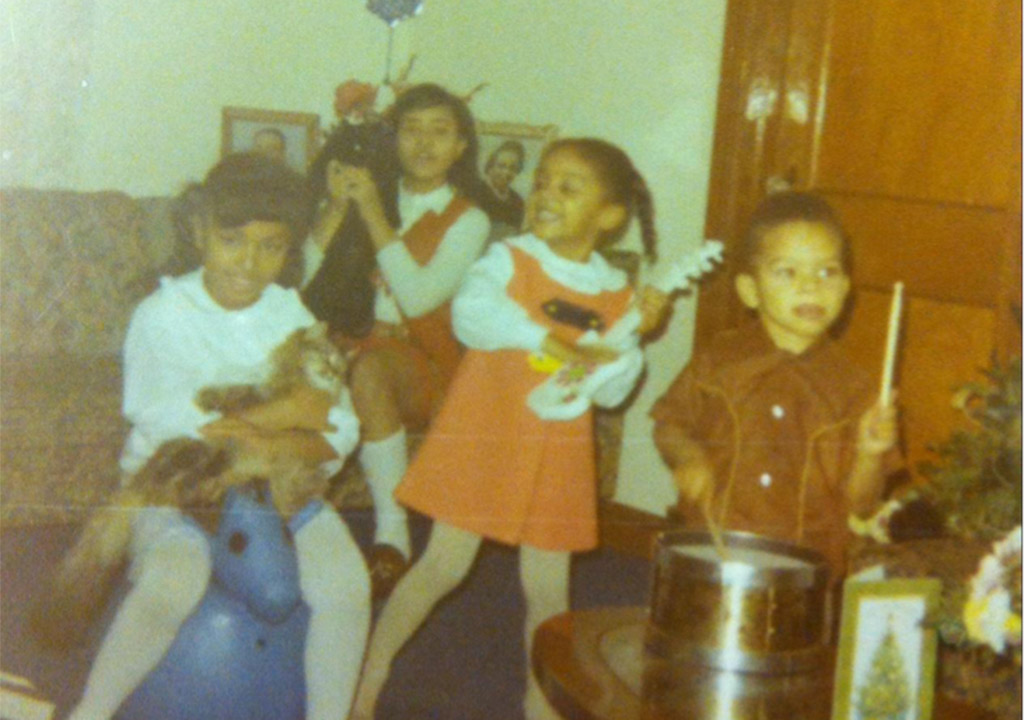
What was your “big break”?
My college prep experience was my big break, and not because it set me on a path toward success. Thanks to an amazing village of family members, music directors, teachers, and ministers, I was already on that path. What the experience did do was put me on a path toward intense exposure to the bigger world.
Now, as a leader engaged in international and national business and human services -- including as a board member of a Silicon-Valley based foundation that works in Africa -- my instinct is to build bridges, to bring the perspective of underprivileged people to conversations about budget, about strategy, about listening to the people we serve. I see issues from many angles.
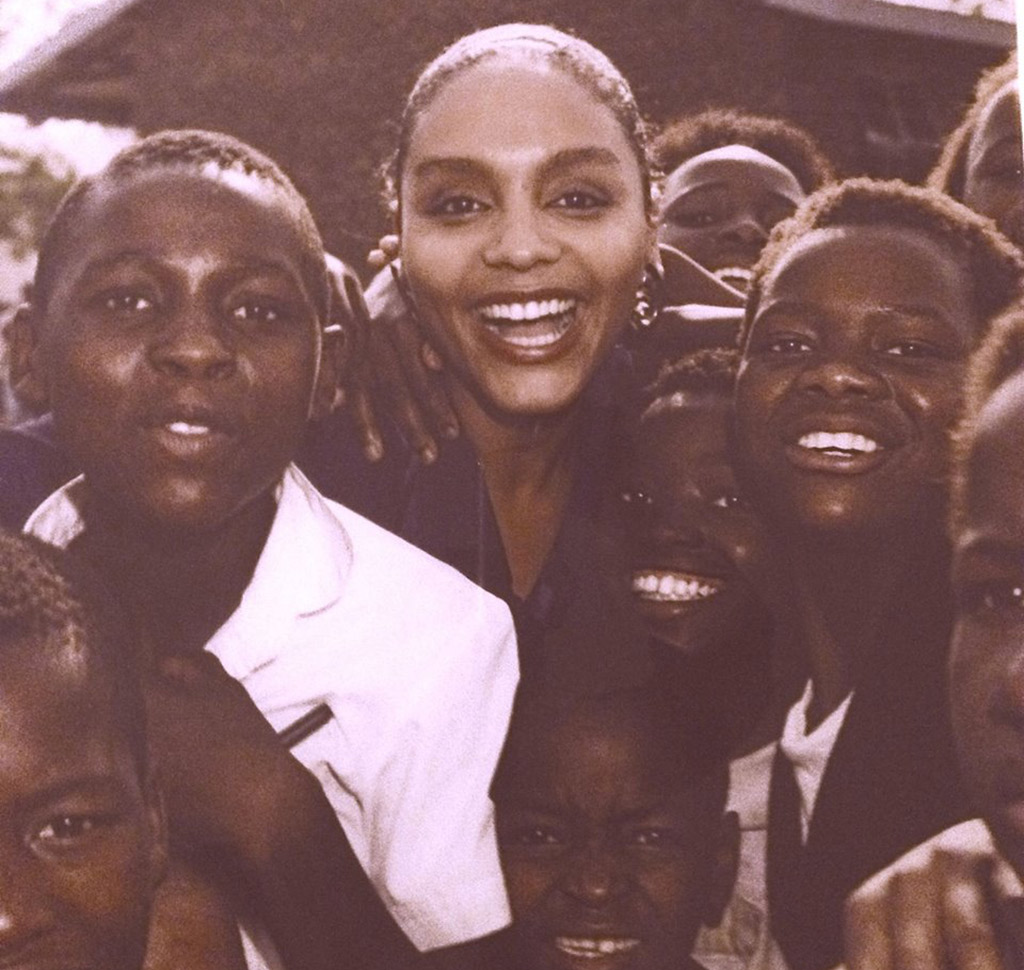 In Kenya, as Peace Corps Director of Congressional Relations; now also on the Board of the Firelight Foundation doing community development work in Africa.
In Kenya, as Peace Corps Director of Congressional Relations; now also on the Board of the Firelight Foundation doing community development work in Africa.
Who is the one person that helped you get where you are today?
For me, there was no one person because the veritable “village” was diverse in every positive way imaginable. For example, over heapings of mixed vegetables at a local cafeteria, my government-funded theatre director told me almost every evening after rehearsals that I was gifted and had to stay healthy to endure the intensity of our shows and workload during junior high school.
The admissions director at Sidwell Friends prep school set up a desk in her office where she coached me on writing while I was supposed to be doing work-study there. Most importantly -- every day -- I have been hugged, kissed and loved unconditionally by my family. I try to recycle that love back into the world through my work.
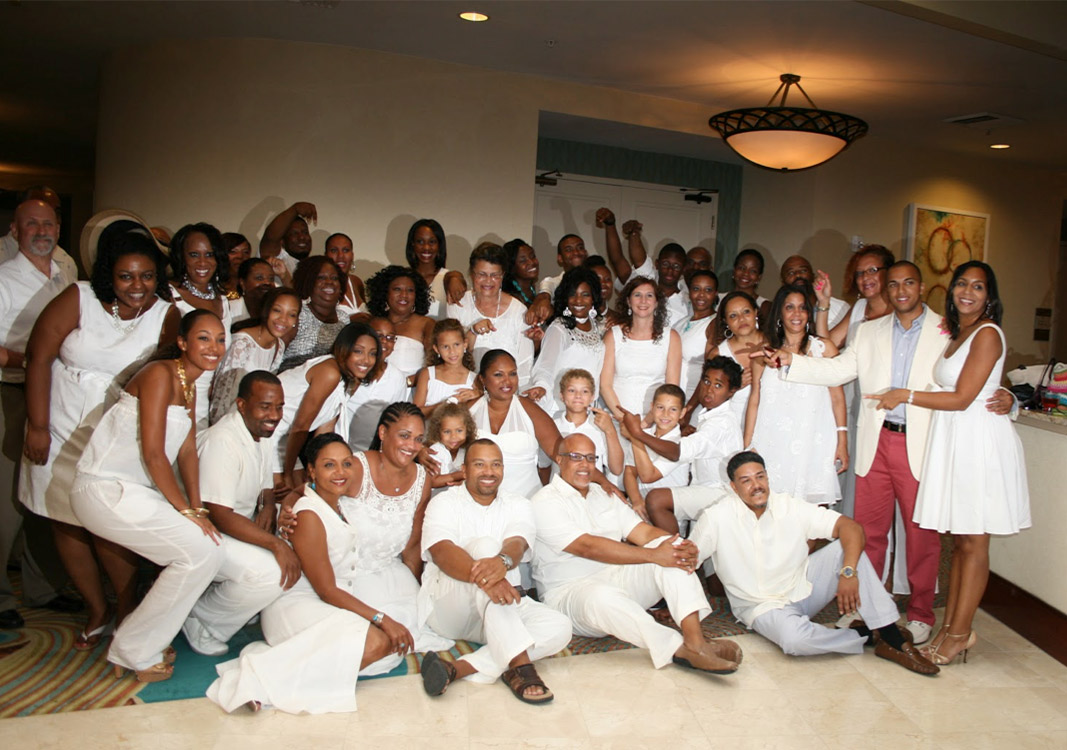 Family reunion and celebration of the birthday of my sister, who also was diagnosed with breast cancer. Hers at age 28, mine at age 32. (Front row, left)
Family reunion and celebration of the birthday of my sister, who also was diagnosed with breast cancer. Hers at age 28, mine at age 32. (Front row, left)
What’s the one thing you do every day that helps you achieve your goals?
That’s easy. I pray. I thank God for giving me the privilege of what we call in my faith “servant leadership.” I thank God for the courageous people -- known and unknown -- who literally died so I can be at the decision making table. I ask for discernment and peace. Then, I go do my best.
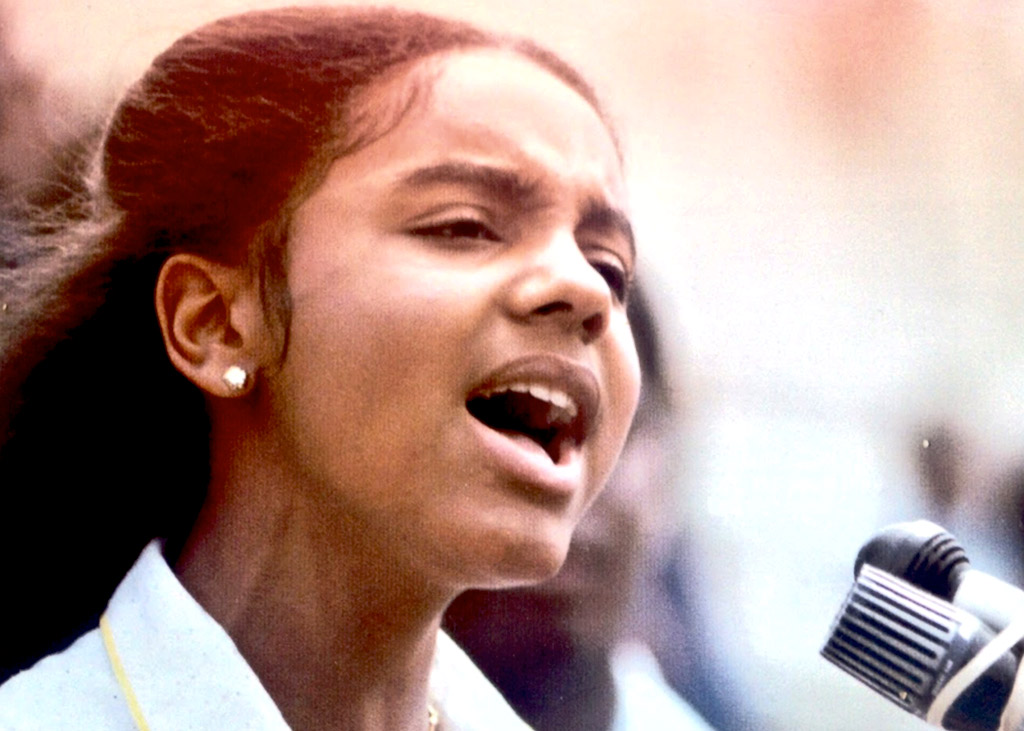 That’s me at 14 years old, singing at the National Capitol in Washington DC during the National March for Jobs, Peace, and Freedom.
That’s me at 14 years old, singing at the National Capitol in Washington DC during the National March for Jobs, Peace, and Freedom.
How do you define success? And do you think you have achieved it?
I think achieving the American Dream means “having hope” -- which, in turn, makes discipline seem worthwhile. Without hope, people make choices they believe will help them survive but not necessarily thrive. If they believe they have no control over improving their lives -- because that’s what they’ve seen for generations or believe about themselves -- then dropping out of school or getting pregnant early, is no big deal.
I have achieved success because I have hope and discipline to do the hard work of serving people in need. Amazingly, it’s what our 80 service organizations have done for 92 years.
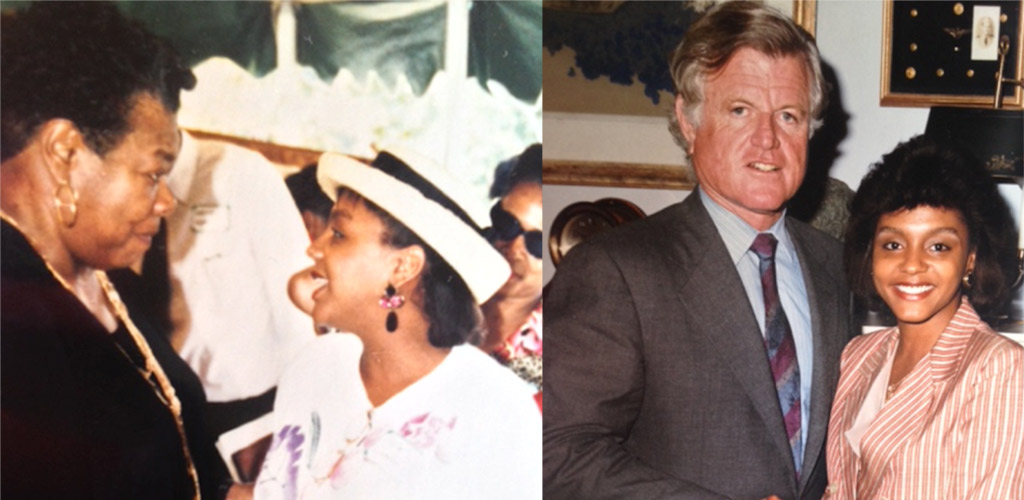 Left: Meeting Maya Angelou at the Skinner Leadership Institute in southern Maryland. Right: With Ted Kennedy. I was an intern with a longstanding African American adviser to him (Mike Frazier).
Left: Meeting Maya Angelou at the Skinner Leadership Institute in southern Maryland. Right: With Ted Kennedy. I was an intern with a longstanding African American adviser to him (Mike Frazier).
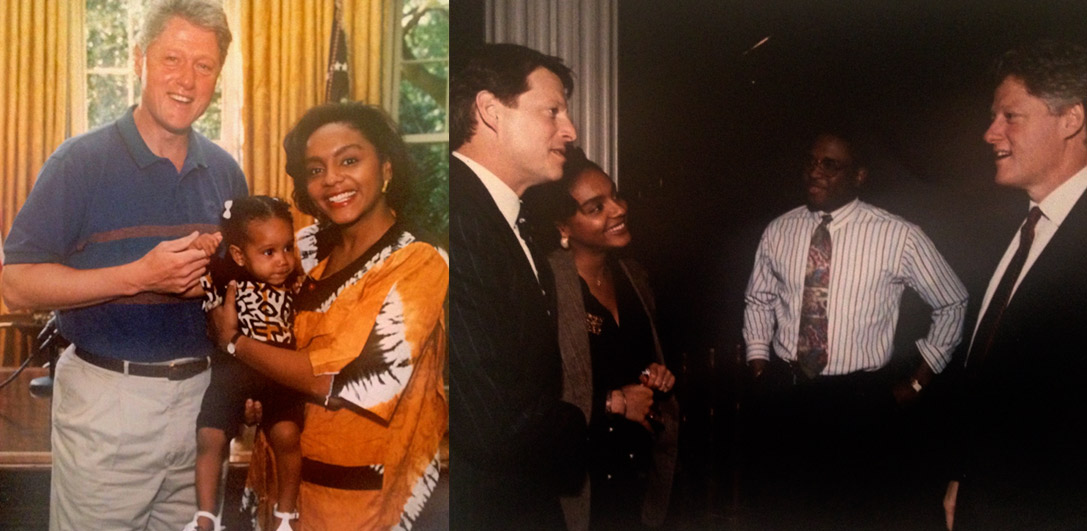 Left: With President Bill Clinton when I worked at the White House. Right: With President Clinton and Vice President Al Gore moving into the White House after working for years with then-Senator Gore, then with him and Clinton in Little Rock at the campaign HQ.
Left: With President Bill Clinton when I worked at the White House. Right: With President Clinton and Vice President Al Gore moving into the White House after working for years with then-Senator Gore, then with him and Clinton in Little Rock at the campaign HQ.
What would you say is your quirkiest habit or trait?
I love watching boxing and I love boxing training (with the bag, not against people!) I cover my eyes when they show bloody close ups but I try to emulate the fighters’ grit and nimbleness – whether it comes from boxing or from my faith walk. Both attributes certainly served me well when I was diagnosed with breast cancer at 32.
In retrospect, I can count on one hand the number of times I have needed to be combative in my career. The soft touch - almost without exception - works better. But it’s nice to know I can draw from a deep well of inner strength.

